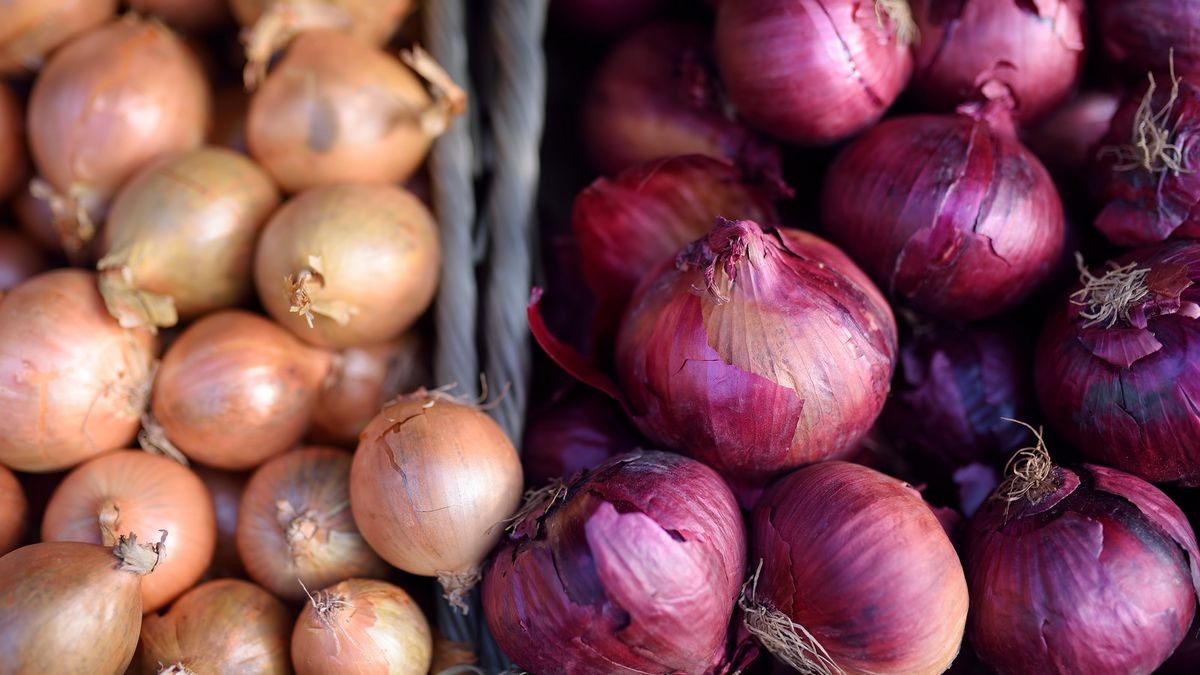
Contents
Onions: Raw vs. Cooked
Onions are bulb-shaped vegetables that grow in the ground. While eating raw onions provides health benefits, there are downsides as well.
Onions, scientifically known as Allium cepa, are bulb-shaped vegetables related to other root vegetables in the Allium family like shallots, leeks, scallions, chives, and garlic.
Onions have a distinctive flavor and pungent smell. They come in various varieties and sizes and can be eaten cooked or raw. They are rich in vitamins, minerals, and fiber, offering numerous health benefits.
However, the nutritional properties of onions can change depending on whether they are cooked or eaten raw. How onions are cooked also affects their properties. Understanding these differences can help you include these nutritious bulbs in your diet effectively.
Onions are categorized into three types: short-day, medium-day, and long-day. This classification is based on the number of hours of sunlight required for the onion bulb to form, usually between 11 and 15 hours.
Onions are also distinguished by their color, with yellow, red, and white being the most popular types in the U.S.
Yellow onions. Yellow or "all-purpose" onions are the most common, making up over 85% of the U.S. onion crop. They are juicy and their flavor can range from mild to strong. They can be eaten raw or cooked in various ways.
Red onions. Red onions account for less than 10% of the U.S. onion crop. They can be crisp, sweet, and mild or spicy, sharp, and pungent. They are often consumed raw in salads or as garnishes.
White onions. White onions make up around 5% of U.S. onion production. They have a medium to strong pungent taste and are rarely sweet or mild. They can be eaten raw or cooked and are commonly used in white sauces.
Nutritional properties of onions
A medium-sized raw onion (100 grams) provides the following nutrients:
- Calcium: 23 milligrams
- Calories: 40
- Carbohydrates: 9.3 grams
- Fiber: 1.7 grams
- Magnesium: 10 milligrams
- Potassium: 146 milligrams
- Protein: 1.1 grams
- Sugar: 4.2 grams
- Vitamin C: 7.4 milligrams
- Water: 89%
Health benefits of eating onions
In addition to being low in calories and a good source of minerals and vitamins, onions offer other health benefits. They are rich in antioxidants and sulfur compounds.
Sulfur-containing compounds in onions can help reduce the risk of cancer. Other health benefits include:
Bone health: Onions’ antioxidants improve bone density and help prevent bone-related problems like osteoporosis.
Heart health: Quercetin, a flavonoid found in onions, lowers cholesterol and blood pressure, reducing the risk of heart attacks and strokes.
Blood sugar regulation: Eating raw onions can help control blood sugar levels, particularly important for managing diabetes.
Reduced cancer risk: Sulfur compounds and quercetin in onions are associated with a reduced risk of stomach, prostate, lung, and ovarian cancers.
QUESTION
The impact of cooking on onions
The method and duration of cooking can affect the properties of onions. While cooking won’t destroy all their nutrients, it can reduce certain benefits.
For example, raw onions have a high concentration of pyruvate, an acid that promotes anti-platelet activity and prevents blood clots. Heating onions lowers pyruvate concentration, weakening this anti-platelet effect.
Steaming: Steaming onions for 3 to 6 minutes completely destroys pyruvate. Beyond 10 minutes, the onion’s nutritional value may be negatively affected.
Boiling: Boiling onions for up to 3 minutes doesn’t cause a significant loss of key compounds, but prolonged boiling can impact their nutritional value.
Cooking in general: Cooking reduces the sulfur compounds and quercetin, which are among the most beneficial elements in onions.
Drawbacks of eating raw onions
Eating raw onions has several downsides to consider:
Heartburn: Raw onions may cause or worsen stomach pain and irritation, known as heartburn, a symptom of acid reflux.
Eye irritation: Cutting and handling raw onions can lead to watering and irritation of the eyes.
Bad breath: Raw onions can cause halitosis (bad breath).
Stomach pains: Onions can aggravate irritable bowel syndrome symptoms, including bloating, gas, and stomach pains, especially when eaten raw.
Allergies: Some people may be allergic to onions, experiencing symptoms like itchiness, runny nose, red eyes, nasal congestion, or a rash.
How to incorporate onions into your diet
Onions have numerous health benefits. Including these nutrient-packed vegetables in your diet is recommended.
The preparation and consumption of onions depend on individual preference, taste, and circumstances. In general, lightly cooking onions for 1 or 2 minutes won’t significantly alter their properties. For maximum health benefits, onions should be mildly cooked or eaten raw.
Sources:
African Health Sciences: "Garlic and onion sensitization among Saudi patients screened for food allergy: a hospital based study."
Advances in Nutrition: "Therapeutic potential of quercetin to decrease blood pressure: review of efficacy and mechanisms."
Advances in Immunology: "The role of short-chain fatty acids in health and disease."
American Journal of Clinical Nutrition: "Habitual intake of anthocyanins and flavanones and risk of cardiovascular disease in men."
The American Journal of Gastroenterology: "The effect of raw onions on acid reflux and reflux symptoms."
Cancer Prevention Research: "Garlic and onions: Their cancer prevention properties."
Food Frontiers: "Health benefits of onion bioactives on hypercholesterolemia, cardiovascular diseases, and bone mineral density."
Food Science and Technology International: "Effect of Heating on Onion (Allium cepa L.) Antiplatelet Activity and Pungency Sensory Perception."
Environmental Health Insights: "Preliminary Study of the Clinical Hypoglycemic Effects of Allium cepa (Red Onion) in Type 1 and Type 2 Diabetic Patients."
Journal of Natural Science, Biology, and Medicine: "Halitosis: From diagnosis to management."
Menopause: "The association between onion consumption and bone density in perimenopausal and postmenopausal non-Hispanic white women 50 years and older."
National Onion Organization: "Onion Color, Flavor, Usage Guide."
Nature: "Plant biochemistry: an onion enzyme that makes the eyes water."
Nutrients: "Effects of Probiotics, Prebiotics, and Synbiotics on Human Health."
Nutrition Journal: "Steam-cooking rapidly destroys and reverses onion-induced antiplatelet activity."
Oncology Reports: "Anticancer and apoptosis-inducing effects of quercetin in vitro and in vivo."
Oregon State University: "Types of Onions and Varieties."
ScienceDirect: "Prevention and treatment of osteoporosis in women: an update."
Scientific Reports: "Onionin A inhibits ovarian cancer progression by suppressing cancer cell proliferation and the protumour function of macrophages."
Tufts University Health & Nutrition Letter: "Are Raw Onions More Nutritious Than Cooked Onions?"
US Department of Agriculture: "Onions, raw."
World Journal of Gastronomy: "Potential beneficial effects of butyrate in intestinal and extraintestinal diseases."
World Journal of Gastronomy: "Potential beneficial effects of butyrate in intestinal and extraintestinal diseases."


